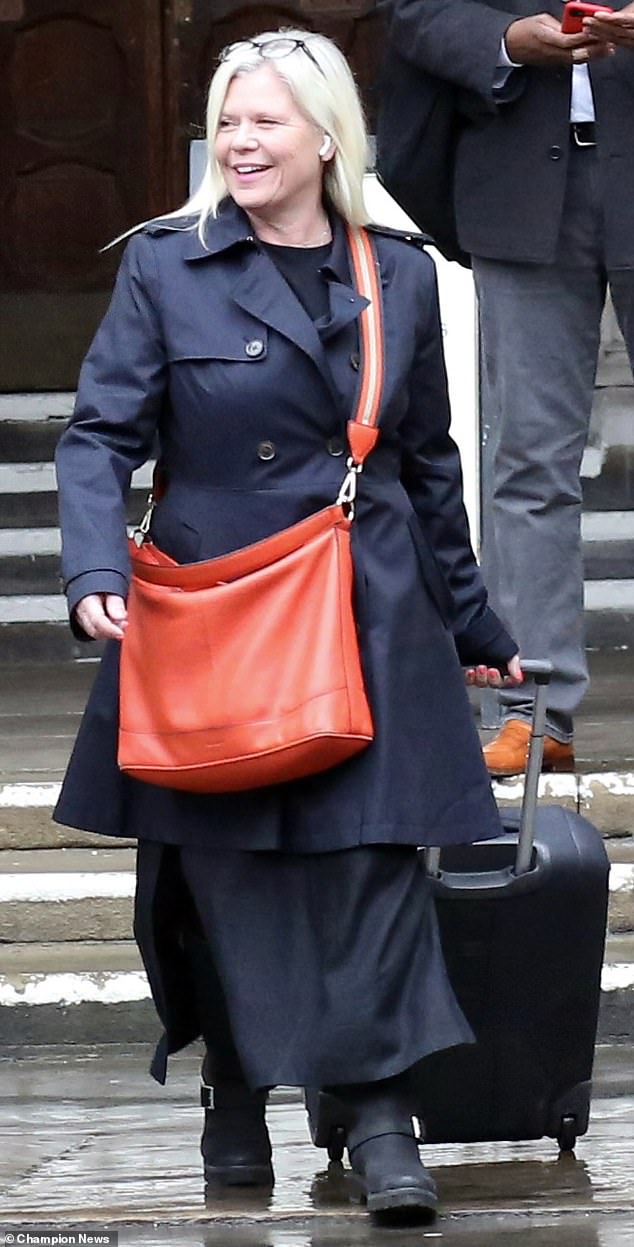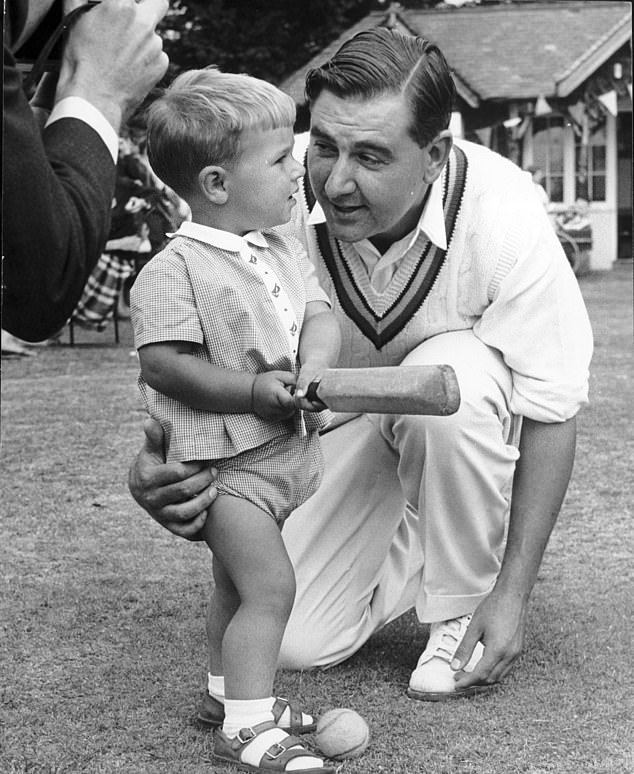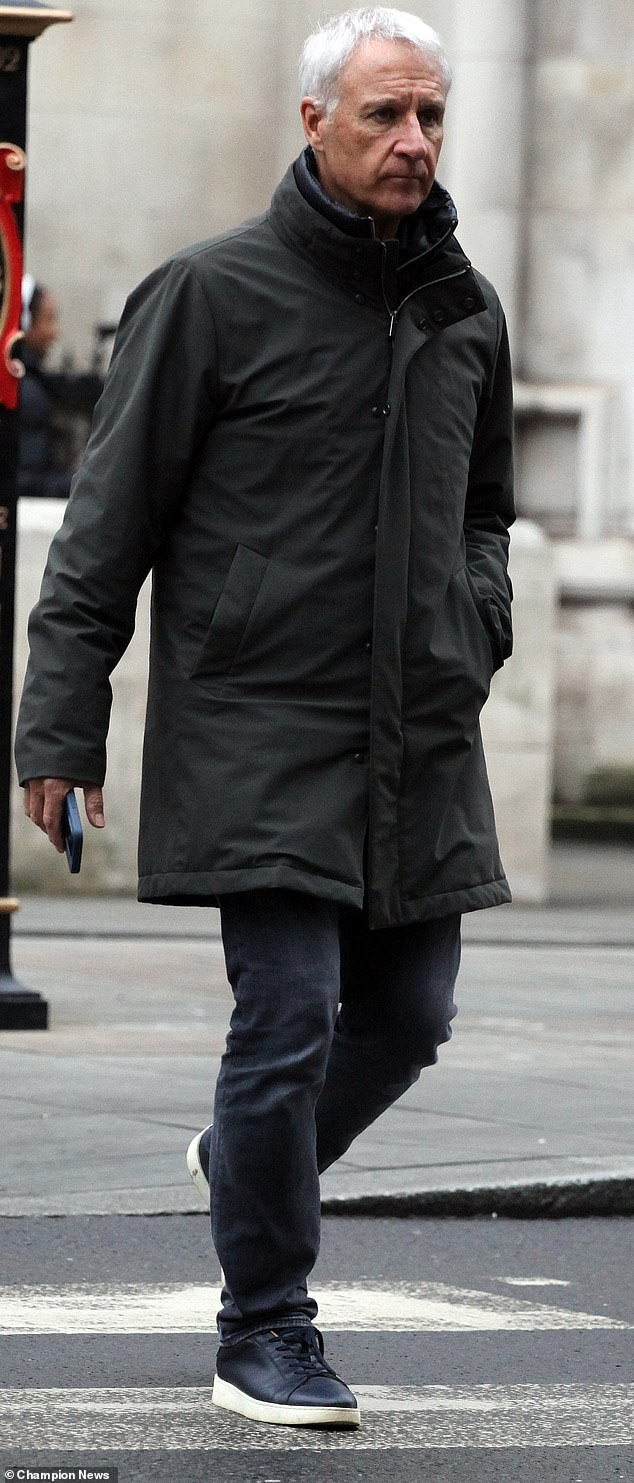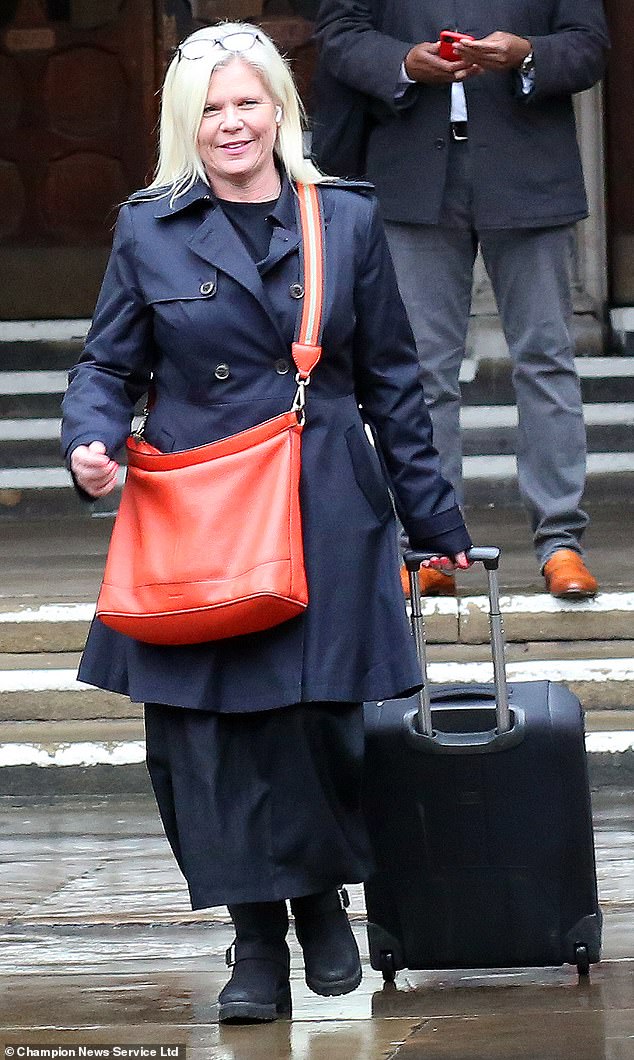A son of England cricket legend Colin Cowdrey has won £159,000 damages from a neighbour after she ‘blackmailed’ him and ruined the sale of his £3.85milllion home.
Film producer Jeremy Cowdrey, whose late father skippered England 27 times and was the first man to play 100 test matches, sued neighbour Vanessa Gibson over ‘lies’ which he said made his sprawling 10-acre mansion in Goudhurst, Kent, unsellable.
The dispute began with Mrs Gibson’s purchase of a strip of land in the village, which bizarrely meant she owned part of Mr Cowdrey’s tennis court.
A row about that was settled outside of court, but when he tried to sell the house, Mrs Gibson sent a ‘clusterbomb’ of emails – including bringing up the resolved tennis court row – jeopardising his sale.
After buyers pulled out, he sued, accusing her of ‘terrorising’ him with a campaign of harassment akin to ‘Japanese water torture’, and has now won a £159,000 payout at Central London County Court.
Judge Jane Evans-Gordon said Mrs Gibson’s ‘intention’ through her ‘unreasonable and oppressive’ campaign had been to try to extract ‘unreasonable sums’ from Mr Cowdrey, 65, so that his sale could go through.
‘I am satisfied that Mrs Gibson’s conduct went well beyond any proper promotion of her own interests and tipped over into a form of blackmail or maliciousness,’ she said.
The court heard that Mrs Gibson, a former futures trader, has lived in the area for many years, but that Mr Cowdrey moved in after buying Crowbourne Farm in early 2022.

Film producer Jeremy Cowdrey (pictured), whose late father Sir Colin Cowdrey skippered England 27 times, has won a court battle against his ‘nightmare’ neighbour

Vanessa Gibson (pictured) was sued over ‘lies’ which Mr Cowdrey said made his sprawling 10-acre mansion in Goudhurst, Kent, unsellable

Pictured is Jeremy’s late father, Sir Colin, who died in 2000 aged 67. He had been a legend of English cricket, becoming the first man to achieve 100 test matches

Pictured is the property in Goudhurst, Kent, which was at the centre of the row
It is made up of a sprawling Grade II-listed farmhouse with its own wine cellar, a separate guest cottage, studio, barn and workshop, a quadruple car port and set over 10 acres of grounds, including a tennis court, stables, woods and two lakes.
Mr Cowdrey told the judge he had been warned about the potential for trouble with his neighbour, who lives in a next door barn conversion, before he bought it.
However, the pair initially had a good ‘neighbourly’ relationship, with Mrs Gibson helping the cricketer’s son feed his ducks.
He said he thought he could get over any problems, but that within a couple of months he realised the property was ‘not right’ for him and decided to sell.
Viewings were arranged and buyers were found, with a sale price of £3.85m agreed, but the purchasers pulled out after a string of emails sent by Mrs Gibson.
The emails suggested that the dispute over the tennis court was still ongoing, when in fact it had been settled when he agreed to fence it off and give up any claim to the strip she had bought.
She had also emailed him, his lawyer and estate agent with allegations relating to his right to run water, electricity, sewage and phone services across her land, and brought up issues of flooding in the area, suggesting it may be down to work done by the previous owners on Mr Cowdrey’s land.
Suing for malicious falsehood and harassment, Mr Cowdrey told Judge Jane Evans-Gordon that Mrs Gibson had ‘terrorised’ him and likened her constant ‘clusterbomb’ of complaints as akin to water torture.

Sir Colin is pictured during his early cricketing days with his young son, Jeremy

Mr Cowdrey (pictured) won £159,000 in damages from his neighbour after she ‘blackmailed’ him and ruined the sale of his £3.85milllion home, a court heard

When Mr Cowdrey tried to sell his home in Kent, Mrs Gibson sent a ‘clusterbomb’ of emails – including bringing up the resolved tennis court row – jeopardising his sale

This image shows one of the lakes on Mr Cowdrey’s sprawling 10-acre country home
‘I likened it to the Japanese drip of water because it was like that,’ he said. ‘We are on the third anniversary of this. It’s been a really horrendous experience.’
Mrs Gibson, 55, representing herself, denied Mr Cowdrey’s claims and said she only raised legitimate issues about the property and that it was in fact Mr Cowdrey who behaved in an ‘ungentlemanly’ way.
But finding for Mr Cowdrey, the judge said the boundary dispute had been settled and that Mrs Gibson had tried to ‘conceal her intention…to interfere with Mr Cowdrey’s sale.’
Her allegations that there were ‘ongoing disputes’ in relation to the tennis court, utility services and breaches of land covenants were ‘false,’ she continued.
‘Standing back and looking at Ms Gibson’s conduct from about March 2022 through to June 2023, it seems to me that her actions were motivated by an improper purpose, namely to cause harm, specifically pecuniary loss, to Mr Cowdrey by preventing him from selling Crowbourne Farm unless he paid her any price she sought,’ she said.
‘I am satisfied that Ms Gibson concealed her purchase of the strip from Mr Cowdrey until she could use her ownership to extract significant payment from him.
‘Ms Gibson was, of course, entitled to forward her own interests which can include benefitting financially from her land and the covenants benefitting that land.
‘But there comes a point where proper motivation tips over into an improper purpose and, in my judgment, that point was reached in this case.
‘Nothing she said persuaded me that she had no ill intent towards Mr Cowdrey, notwithstanding her repeated assertions that she was only being neighbourly and concerned to look after his best interests.’
At trial, Mr Cowdrey said his house would now be worth £3.7m absent Mrs Gibson’s allegations and so sued for the £150,000 difference between that and the £3.85m sale he agreed.
Agreeing, the judge said: ‘In my judgment, the sum of £150,000, together with interest, is the correct measure of damages.’

Colin Cowdrey is pictured, left, with Ted Dexter as they led the England team out during a test match against Pakistan at Headingley, in Yorkshire
The judge also awarded an additional £9,000 damages for the ‘oppressive and unreasonable’ campaign of harassment.
‘Any reasonable person, in my view, would see this as unreasonable and likely to cause anxiety, alarm or distress,’ she said.
‘On this basis, Ms Gibson ought to have known that her conduct would have that effect. She had no proper basis for raising most of the issues that she did raise.
‘The consequence of this is that Mr Cowdrey lost a sale; however, he cannot recover that loss twice. He is also entitled to damages for the anxiety and distress caused to him by this conduct. I am satisfied that Mr Cowdrey has suffered such anxiety and distress.
‘It seems to me that an appropriate award is £9,000.’
Jeremy Cowdrey is the second son of Colin, Lord Cowdrey, who was the first cricketer to play 100 Tests and was the first to be made a peer for his services to the game.
Lord Cowdrey was an outstanding batsman, famed for his style and nonchalance both on and off the field, with one commentator saying he seemed to ‘charm rather than strike the ball’ and a fellow England player labelling him an ‘unbridled genius’.
His second son, Jeremy, worked as a City stockbroker for 20 years, later switching to working as a film producer and helping create the movie ‘Summer in February’ in 2013, starring Dan Stevens of Downton Abbey fame.
Lord Cowdrey’s two other sons, Chris and Graham, went on to play cricket for Kent and Chris also saw six Tests for England. He also had a daughter, Carolyn.












